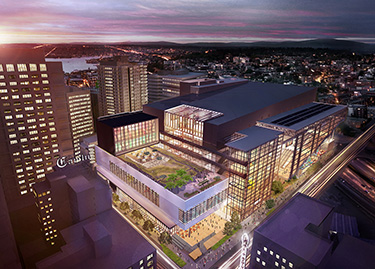|
Subscribe / Renew |
|
|
Contact Us |
|
| ► Subscribe to our Free Weekly Newsletter | |
| home | Welcome, sign in or click here to subscribe. | login |
Architecture & Engineering
| |
 |
October 26, 2017
Survey: Arup
Specialty: Design, planning, engineering and consulting services
Management: Joshua Yacknowitz, Seattle group leader
Founded: 1946 in London; 2003 for Seattle office
Headquarters: N/A
2016 revenues (local office): $12 million
Projected 2017 revenues (local office): $12.5 million
Projects: Washington State Convention Center addition, Seattle; Pike Place MarketFront, Seattle; University of Washington West Campus Utility Plant, Seattle
Joshua Yacknowitz, Seattle group leader for Arup, shared his thoughts about the company’s growth, recruiting challenges, and how the design-build delivery model is affecting the industry.
Q: How big is the Seattle office and what do you focus on? Has that changed recently?
A: Our Seattle office employs over 50 staff, and has been growing rapidly with our staff count roughly doubling over the past three years. Our current service offerings are focused on building engineering (structural and MEP), and we also have specialist acoustic, audiovisual, and lighting design and consulting capability.
While building engineering has been our core offering in Seattle for many years, our specialist capability has developed more recently, and we plan for continued growth and diversification of our discipline offerings over the next few years.
Q: Where will near-term growth come from?
A: Our predominant market sectors locally are commercial, arts and culture, aviation, and hotels and leisure. We have strong architect and developer relationships in these sectors and anticipate continued growth there.
We plan to expand our direct owner relationships to complement the existing work, and we expect this growth to be focused on technology, higher education, health care, government, transportation, research and manufacturing clients. Arup as a firm has considerable experience in these areas, and we intend to leverage this expertise here in Seattle over the next few years.
With the growth of the innovation economy in the Pacific Northwest, and considering Seattle’s unique position as a nexus for education, technology and industry in the region, we anticipate a lot of opportunity out of these sectors.
Q: What are the biggest challenges you face?
A: In such a rapidly expanding, vibrant economy, the recruitment of excellent talent is extremely competitive in this region. We expect this to be a fact of life in Seattle for the foreseeable future and have focused heavily on graduate recruitment from the very fine universities in this region.
Arup also encourages national and international mobility of its staff, and we have sought to augment local recruitment with experienced staff from some of our other offices, bringing international expertise, which differentiates us in the market.
Another challenge has been the growing reliance on design-build procurement in the region. This has led us to a variety of design roles on projects which require adjusted approaches to project management and delivery amongst owners, contractors and architect/engineers.
Q: Where is the local design and construction market headed?
A: The increasing role of developers in projects for institutional clients such as universities will likely lead to significant shifts in how those institutions plan for and fund such projects.
Another major driver of investment will likely be public infrastructure such as mass transit, which will be needed to serve the rapidly growing population of the area.
Q: What are some important industry trends, either positive or negative?
A: We anticipate expanding use of design-build and related delivery models, which will continue to redefine the roles and responsibilities of consultants and contractors. There is also a growing project management and delivery capability emerging among technology companies and startups, and we see this reshaping how those clients procure projects.
Also, with the latest natural disasters in Texas, Florida, Puerto Rico and Mexico, Seattle needs to think seriously about how we as a city and community are going to deal with the shocks and stresses around urban resilience.
Other Stories:
- Ice Box Challenge: a cool test of Passive House
- Survey: IA Interior Architects
- Surveys: NAC Architecture
- Survey: AHBL
- Survey: Lemons Architecture
- Is growth only benefiting a small segment in Seattle?
- Rock wool’s new role: protecting exterior wood stud walls
- Get ready for the new year — and new energy codes
- After 10-year engagement, Kinects inverts ‘wedding cake’
- WSU cultural center: ‘How are you going to build this?’
- High-performance building? Start with early design analysis
- How ‘affordable’ housing is disappearing in Seattle
- How long will your AV last? Consider your cell phone
- Survey: Code Unlimited



